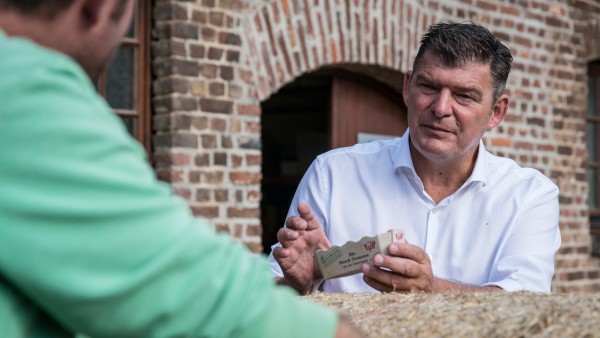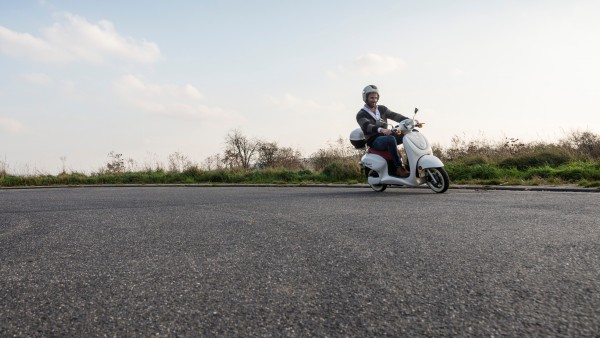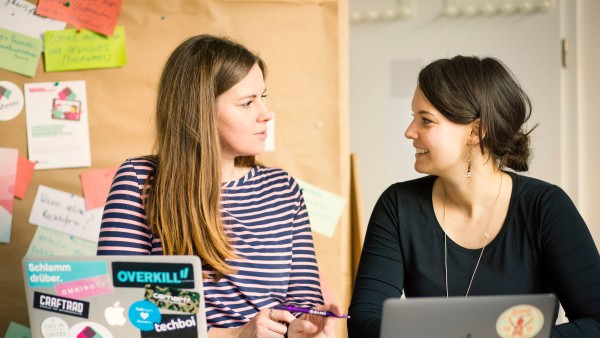The doner kebab stole the crown from the German currywurst a long time ago. However, it's hard to find one of these fast-food treats that doesn't contain a whole lot of garlic and spices. Roman Will and Jan Plewinski from Bremen in Germany have developed a drink that helps your breath stay fresh. Their innovative soft drink garnered them the KfW Entrepreneurs' Award in 2017.
Prize-winning pop
Papa Türk: how an idea turned into a business (KfW Group/n-tv). This video is only available in German.
Dressed in jeans and trainers, Roman Will and Jan Plewinski (both in their early 30s) look like two guys you wouldn't mind joining for a night at the pub. Or for some lunch at a Turkish takeaway. These just so happen to be the two places where their business idea was born. The two friends love stuffed flat breads; the spicier, the better. So, wouldn't it be great if there was the perfect drink to go with your kebab? After all, you've got burger and a beer, or chips and a coke. But what goes with a doner kebab?
Once you've put a question like this out there, it will keep the conversation at the pub going all night long. And yet, the drink needs to serve an additional purpose, one that is pretty obvious. It needs to freshen your breath so that, after enjoying the spicy flavours of a Turkish kebab, you are ready to go on a date or even to a job interview.
Necessity is the mother of invention
Which drink refreshes your breath and also goes perfectly with a doner kebab? The idea for Papa Türk was born at a Turkish takeaway.
The pair begin their research with Arabic home remedies and end it at the chemists' around the corner. They learn that people in countries like Morocco or Tunisia eat lots of parsley to neutralise the smell of spicy food. In our corner of the globe, we have tablets that do the same thing. Like parsley, they contain lots of chlorophyll, which helps to prevent bad breath.
"We spent a fortune on these chlorophyll tablets, crushed them down and mixed them with sugar water and any herbs and spices we could find. We then used the Sodamax to add carbon dioxide to our green concoction. It smelt a lot better than it tasted; it was awful," says Roman Will.
They spend the next few weekends in the kitchen at Jan Plewinski's shared flat conducting experiments. Roman Will, who is doing his Masters in Entrepreneurship in the Netherlands, travels all the way back to his home town of Bremen especially for it. Jan Plewinski is working in a communications agency. If they were to start their own business, it would have to be a sideline for them both.
Read more below the gallery.
How it all began
The idea behind the Papa Türk green soft drink was born at a Turkish takeaway.
Papa Türk at kiosks
Roman Will (left) hosted the first tasting sessions at a kiosk. The entrepreneurs also form friendships with many of their customers.
They approach a beverage bottler to see if he can develop the product for them — too complicated, too expensive, he turns them down. He does, however, recommend Ostwestfalen-Lippe University of Applied Sciences. This turns out to be a stroke of luck as one of the professors agrees to take on the project. A specialist in drinks technology, he and his students test the composition of flavours, adding various types of chlorophyll to the mix. However, in order to receive market approval, the drink must not change in colour, form or flavour.
The question as to whether chlorophyll extracted from nettles, alfalfa and grass is even suited for this purpose is unclear. The substance is sensitive to sunlight and heat. Complicated tests using incubators and UV radiation simulate the storage process. "We had to suffer a few setbacks. However, now I can talk about micro-organisms, yeast formation and flocculating sherbet almost as much as music," says Mr Will.
A long road
For a number of weeks, Roman Will, who was doing his Masters in Entrepreneurship in the Netherlands, spent the weekends travelling back to his home town of Bremen to work on his new iconic drink with Jan Plewinski.
Every two weeks, the two friends travel to the university and test the mixtures. After nine months under development, they hand out free samples at the institute's open house. "We just found it kind of cool to have our own drink. And even though our livelihoods didn't depend on its success, we had long since lost our hearts to the idea," reminisces Roman Will. They present the first bottles as a gift to the manager at their favourite doner kebab shop. "We were always allowed to call him Papa Türk. And because this is where it all started, it's also the name of our company. There's even a drawing of him on the bottle," explains Jan Plewinski, who designed the labels.
Their product wins the entrepreneurs a number of prizes in corporate competitions. They then register for a European patent. Banks begin financing their plans. This enables them to start production of the three different flavours, lime and mint, cola, and shisha apple. In the autumn of 2016, they appear on the TV show "Die Höhle der Löwen" (similar to "Dragon's Den" in the UK). Papa Türk wins over the entrepreneur Ralf Dümmel, who offers EUR 400,000 for a 30% share of the business. The deal is signed, meaning Roman Will and Jan Plewinski now have one less thing to worry about. Because large-scale production requires them to pay in advance, the financial commitment helps them out a lot. They can also rely on the investor's support in expanding their sales network.
The garlic killer and his crew
The makers of Papa Türk are working on new products. They are even planning a chlorophyll-based fruit gum.
Nowadays, Papa Türk can be found on the shelves at all supermarkets in the "real" chain; lots of fast food and drinks shops also sell the "Kuss-Brause" (kissing pop), as the drink is also called. One such shop is located in the Steintor district of Bremen. Roman Will gets off the tram here and winds his way through shops, pubs, shisha bars and cafes towards the large Kiosko Amigos. Nageeb, who runs the establishment with his cousin, greets Roman with a warm hug: "How's it going, my friend? How's business?"
The kiosk was one of the first outlets to sell Papa Türk, alongside shisha tobacco, beer and crisps. "Drinks containing mint are very popular in our home country. And now the guys are doing the same in Bremen, so of course I'm going to support them. Lots of customers buy Papa Türk because it is local and because it's something special," says Nageeb. The fact that this green drink also goes perfectly with rum was demonstrated at a tasting session at the kiosk. A well-known figure from the hip-hop scene appeared and soon a colourful crowd had taken over the entire street. That is, until the police appeared and broke up the party. Since then, the "Amigos" have toned things down a bit.
A few metres down the road, Ismet is preparing for the lunchtime rush. Veal and chicken spin on the doner rotisserie; black tea is served in miniature glass cups. The small takeaway has around a dozen seats and a large TV showing Turkish music videos. A certificate hangs on the wall – Papa Türk presented the tiny restaurant with the "Golden Doner Award" and the diploma "Kebab Summa Cum Laude". The owners are delighted to welcome their visitors and hand a lavishly stuffed doner kebab over the counter.
However, Roman Will doesn't have much time to chat today. Four years after its creation, Papa Türk is in the midst of restructuring. The company is merging its office with an advertising agency while the shareholder structure and investors are also changing.
He's not yet willing to reveal much about the changes, nor about the planned products such as the fruit gum containing chlorophyll. "Papa Türk will end this year with a profit; that's a major coup. And one thing is certain: we founded the business for fun and we don't want to lose that." He takes a hearty bite into his kebab. A Papa Türk for the road will extinguish any remnants of garlic.




Data protection principles
If you click on one of the following icons, your data will be sent to the corresponding social network.
Privacy information